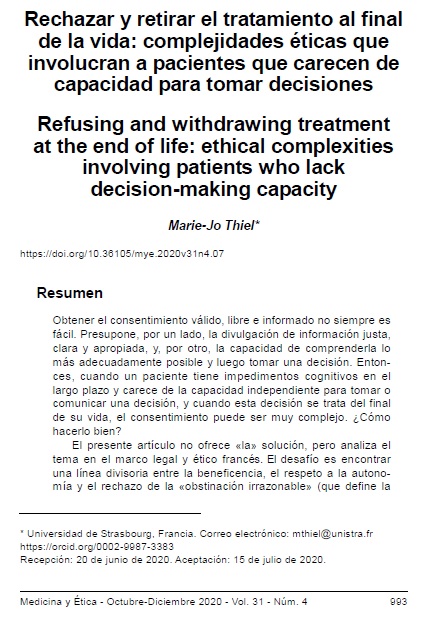Refusing and withdrawing treatment at the end of life: ethical complexities involving patients who lack decision-making capacity
Main Article Content
Abstract
Obtaining valid, free and informed consent is not always very easy. It presupposes on the one hand disclosure of fair, clear and appropriate information, and on the other hand the capacity to understand as properly as possible, and then to take a decision. So when a patient has long-term cognitive impairments and lacks the capacity independently to make or communicate a decision and when this decision is about his or her end of life, the consent may be very complex. how to do it right? The present article does not give «the» solution but it discusses the issue in the French legal and ethical framework. The challenge is to find a crest line between beneficence, respect for autonomy and the refusal of «unreasonable obstinacy» (which defines futility in French Law). Beneficence might mean withdrawing (orwith holding) ongoing medical treatments (chemotherapy, radiotherapy, etc.) when they become increasingly ineffective and furthermore, are aggressive and intrusive for the patient (leading to a decrease in his quality of life). But when the patient cannot consent or seems to disagree, how can we go forward? The contribution will first examine the value of patient decision
making and consent in health care and then the role that family and caregivers can play in supporting these. Since death is a unique, definitive moment, we must not forget that often the experience of relatives with the patient conditions both the decision-making process and their mourning process. Finally, I will examine and discuss three specific clinical situations when a decision has to be made regarding withholding and withdrawing of treatments: when a patient is conscious, when he/she is unconscious and has no advance directives, when he/she knowingly refuses treatment. The struggle is to know what truly matters to the dying person in order to respect his or her wishes.
Downloads
PLUMX Metrics
Article Details

This work is licensed under a Creative Commons Attribution-NonCommercial-ShareAlike 4.0 International License.
Medicina y Ética is distributed under a Creative Commons License Atribución-NoComercial-CompartirIgual 4.0 Internacional.
The author keeps the property rights with no restriction whatsoever and guarantees the magazine the right to be the first publication of the work. The author is free to deposit the published version in any other medium, such as an institutional archive or on his own website.
References
2. Veshi D. Comments on the Lambert case: the rulings of the French Conseil d’État and the European Court of Human Rights. Med Health Care Philos. 2017 Jun; 20(2): 187-193. Wikipedia. Affaire Vincent Lambert. Available at: https://fr.wiki
pedia.org/wiki/Affaire_Vincent_Lambert (consulted 2020 Jun 09).
3. Wolf M. Consentement, éthique et dogmes. Ethics, Medicine and Public Health. 2015 Jan; 1(1): 120-4. https://doi.org/10.1016/j.jemep.2014.12.002
4. Hennette-Vauchez S. Disposer de soi? Une analyse du discours juridique sur les droits de la personne sur son corps. Paris: L’Harmattan; 2004.
5. Ricoeur P. Vivant jusqu’à la mort. Suivi de Fragments. Paris: Seuil; 2007.
6. Ricoeur P. Philosophie de la volonté I. Le volontaire et l’involontaire, Paris: Aubier (1950); 1988.
7. Crouch G. Female Dutch doctor drugged a patient’s coffee then asked her family to hold her down as she fought not to be killed, but did not break the country’s euthanasia laws. Daily Mail. 2017, Jan 28. [Accessed 2017, Jul 10]. Available at:
http://www.dailymail.co.uk/news/article-4166098/Female-Dutch-doctor-druggedpatient-s-coffee.html»\l«ixzz4mSevx78w
8. Thiel MJ. Introduction. In Thiel MJ, editor. Entre Malheur et espoir. Annoncer la maladie, le handicap, la mort. Strasbourg: PUS, 2006; 5-20.
9. Kress JJ. Éthique en psychiatrie: information, consentement, décision. In Marie-Jo Thiel, editor. Où va la médecine? Sens des représentations et pratiques médicales. Strasbourg: PUS; 2003; 55-67.
10. Kress JJ. Aspects éthiques du consentement à la psychothérapie. Ann Psychiatr. 1998; 13(2): 85-90.
11. Thiel MJ. Personal Capacity to Anticipate Future Illness and Treatment Preferences. In Lack P, Biller-Andorno N, Brauer S, editors. Advance Directives. Dordecht: Springer. 2014; 17-35. https://doi.org/10.1007/978-94-007-7377-6_2
12. Abbott KH, Sago JG, Breen CM, Abernethy AP, Tulsky JA, Families looking back: one year after discussion of withdrawal or withholding of life-sustaining support. Crit Care Med. 2001 Jan; 29(1): 197-201. https://doi.org/10.1097/0000 3246-200101000-00040
13. Mazaud A. Fin de vie en réanimation: vécu et prise en charge des familles, vécu des soignants. Jusqu’à la mort accompagner la vie. 2019 Jan; (136): 95-106. https://doi.org/10.3917/jalmalv.136.0095
14. Davidson JE, Aslakson RA, Long AC, Puntillo KA, Kross EK, Hart J, Cox CE, Wunsch H, Wickline MA, Nunnally ME, Netzer G, Kentish-Barnes N, Sprung CL, Hartog CS, Coombs M, Gerritsen RT, Hopkins RO, Franck LS, Skrobik Y, Kon AA, Scruth EA, Harvey MA, Lewis-Newby M, White DB, Swoboda SM, Cooke CR,Levy MM, Azoulay M, Curtis JR. Guidelines for Family-Centered Care in the Neonatal. Pediatric, and Adult ICU. Crit Care Med. 2017 Jan; 45(1): 103-128. https://doi.org/10.1097/ccm.0000000000002169
15. Jacquemin D. Bioéthique, médecine et souffrance. Jalons pour une théologie de l’échec. Québec: Médiaspaul; 2002.
16. Tomczyk M, Viallard ML, Beloucif S, Mamzera MF, Hervé C. Sédation continue maintenue jusqu’au décès: comment en informer le malade et recueillir son consentement? Médecine Palliative. 2015; 14(2): 111-117. https://doi.org/10.1016/j.medpal.2015.01.003
17. Jankélévitch V. Mort. Paris: Flammarion, 1977.
18. Favereau E. Attention «patient remarquable». Libération, 2019 avril 9. Available at: https://www.liberation.fr/france/2019/04/09/attention-patient-remarquable_1720079
19. Canadian Catholic Bioethics Institute and International Association of Catholic Bioethics. Reflections on Artificial Nutrition and Hydration. National Catholic Bioethics Quarterly. 2004 Winter: 774-782. Available at: https://iacb.ca/wp-content/uploads/2018/06/ANH.pdf https://doi.org/10.5840/ncbq20044410
20. Mieth D, Mieth I. Sterben und Lieben. Selbstbestimmung bis zuletzt. Freiburg im Breisgau: Herder Verlag; 2019.
21. Thiel MJ. Devoir mourir au nom de son autonomie. La Croix. Mars 6, 2017; 26.
22. Olivier C, Thiel MJ, La fin de vie au risque d’une spoliation de l’autonomie. Esprit. 2017 déc. (440): 124-135. https://doi.org/10.3917/espri.1712.0123
23. Hum P, Boury D, Danel T, Demailly L, Dujardine V, Ethuin C, Lequin F, Pruvot FR, Racine A, Valette P, Vandoolaeghe S, Weil B, Weill S. Le refus de soin: forces et faiblesses du consentement. Éthique et santé. 2015; (12): 56-63. https://doi.org/ 10.1016/j.etiqe.2014.09.002

